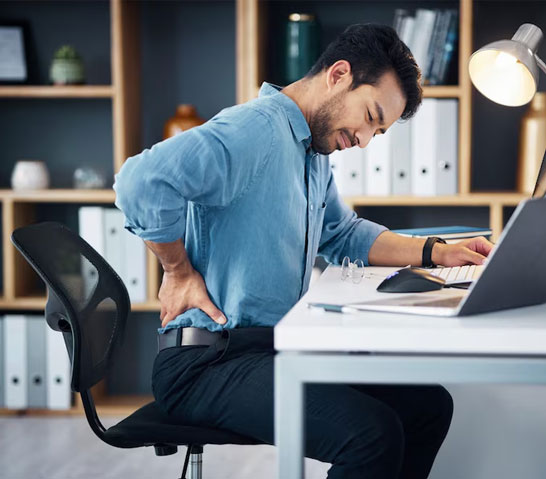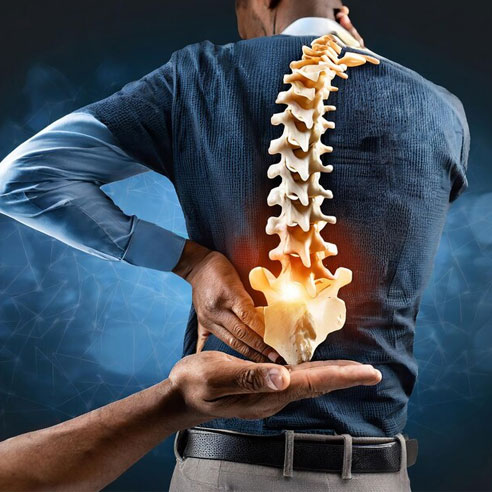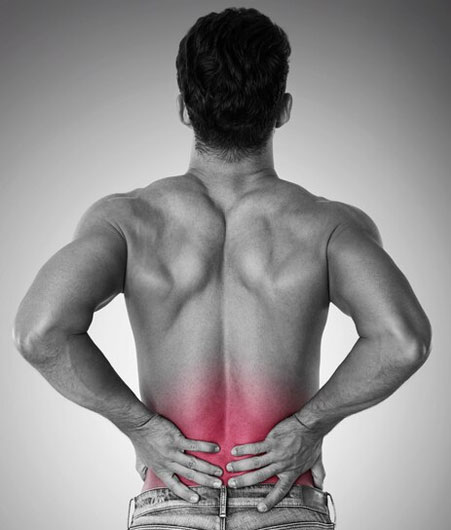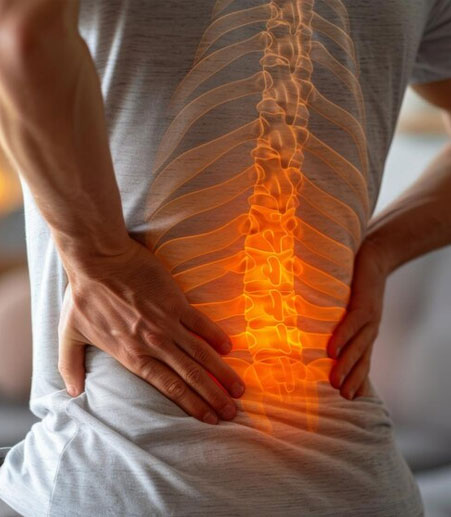Poor Posture
Sustaining improper posture over time places undue strain on the spine, increasing vulnerability to disc injuries and degeneration.
Low back disc injuries can significantly affect your daily life, causing pain, stiffness, and restricted movement. These injuries often result from poor posture, sudden trauma, or repetitive strain, leading to disc herniation or degeneration. Early diagnosis and treatment are crucial to prevent chronic complications and restore mobility. Osteopathic care offers a holistic approach to addressing the root cause of your discomfort, focusing on reducing pain, improving spinal alignment, and promoting long-term healing. Through gentle techniques, osteopaths help release tension, enhance flexibility, and support recovery. Take proactive steps today to regain your comfort and keep your spine healthy and strong.

Sustaining improper posture over time places undue strain on the spine, increasing vulnerability to disc injuries and degeneration.
Accidents, heavy lifting, or falls can cause abrupt, intense pressure on spinal discs, resulting in herniation or chronic pain.
Continuous bending, twisting, or high-impact activities stress spinal discs, gradually wearing them down and causing long-term damage.
With age, spinal discs lose elasticity, becoming more susceptible to injury, degeneration, and related low back pain symptoms.
Low back disc injuries can significantly disrupt everyday life. Simple tasks like bending, lifting, or even sitting for extended periods become challenging and painful. Persistent discomfort can interfere with sleep quality, reduce energy levels, and affect work productivity. Beyond the physical impact, these limitations may lead to emotional stress and frustration. Tailored osteopathic care focuses on improving spinal health, alleviating pain, and restoring range of motion, enabling patients to regain their daily routine. By addressing underlying issues and promoting proper alignment, osteopathic treatments aim to support long-term recovery and a more active, pain-free lifestyle. Prioritize your well-being for lasting relief.

Osteopathic adjustments restore proper spinal alignment, reducing pressure on discs and alleviating associated pain.
Targeted therapy strengthens surrounding muscles, improving stability and promoting a balanced, healthy posture.
Gentle mobilization techniques enhance spinal mobility, supporting long-term recovery and improved daily function.

Taking proactive steps can significantly reduce the risk of long-term complications from low back disc injuries. Maintain proper posture during daily activities to prevent unnecessary strain on spinal discs. Regular physical exercise, focusing on core strengthening and flexibility, supports the spine and reduces stress. Use ergonomic furniture and supportive footwear to ensure alignment and comfort. Avoid heavy lifting or sudden twisting movements to protect the lower back. Early diagnosis and treatment of symptoms are essential for preventing chronic issues. Osteopathic care can help restore spinal balance, alleviate discomfort, and promote mobility, ensuring a healthier, pain-free future with fewer complications.

Experience effective relief with tailored osteopathic treatments and innovative methods to restore spinal health naturally.
Early treatment minimizes discomfort, reducing inflammation and addressing disc issues to prevent escalation.
Timely care helps restore flexibility and ease movement, promoting quicker recovery from spinal disc injuries.
Proactive intervention often eliminates the need for surgical procedures, ensuring a safer and natural recovery process.
Addressing issues early ensures better spinal alignment and reduces future risks of chronic back pain.
Symptoms include sharp lower back pain, leg numbness, reduced flexibility, and difficulty standing or walking.
Manual therapy improves spinal alignment, relieves pressure, and promotes natural healing through gentle mobilization techniques.
Yes, with early intervention, physical therapy, and proper care, many disc injuries heal naturally.
Maintaining proper posture, regular exercise, and avoiding heavy lifting are key to prevention.
© All Rights Reserved by Kriston Healthcare